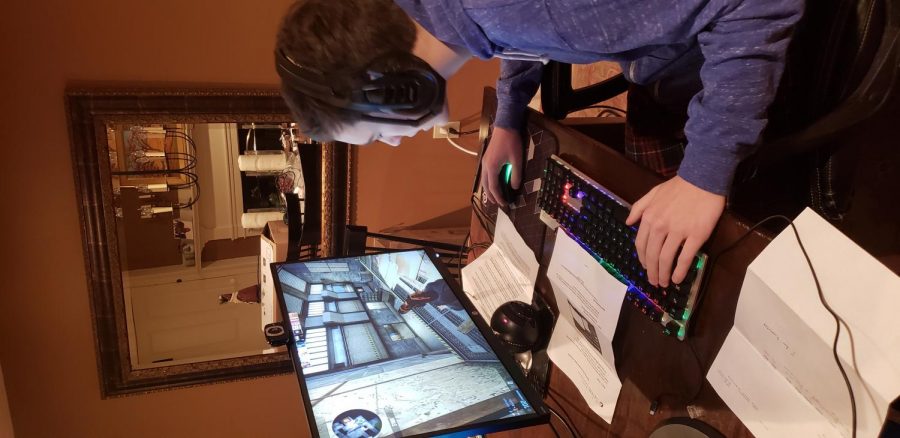Beyond the Game
Focused Gamer.
April 1, 2021
Chances are, you or someone you know is an avid gamer. Starting in universities and spreading to arcades and now to homes, gaming has come a long way. In fact, an estimated 2.7 billion people play video games. Gaming and gamers have always faced opposition and negative stereotypes. Gamers in the media have often been depicted as unattractive, out of shape, dirty, and lonely. But do these harsh stereotypes hold any truth?
While many choose to focus on the negative aspects of gaming and gamer culture, there are numerous benefits to gaming. Physically, it improves hand-eye coordination and fine motor skills. A study found that among surgeons, those who play video games were better at advanced procedures and 37% less likely to make mistakes. I don’t know about you, but I will request a gamer surgeon next time I need surgery. Many of the benefits of gaming are cognitive. Gaming can boost grey matter and brain connectivity, which is good because the grey matter is where most of our processing takes place. Other cognitive benefits of gaming include increased problem-solving ability and academic performance from playing strategy games and increased spatial thinking skills from playing first-person shooters. In addition, playing video games increases creativity among children, while other forms of technology decrease creativity. Parents should think about choosing video games over social media or television for their children’s leisure time.
One of the biggest negative stereotypes about gamers is that they don’t have friends and are losers. This turns out to be pretty far from the truth. First of all, gaming is a very social activity for the most part. Research shows that over 70% of gamers play with a friend. They are talking, working together to solve problems within the game. This communication has benefits. Children who play video games have better grades, social skills, and more relationships with other students due to the collaborative nature of most games. In addition to strengthening existing friendships, it can even facilitate the creation of new bonds. About two-thirds of gamers claim to have met up to 5 friends while gaming and another 37% have met even more. The bottom line is that the perception of gaming as an antisocial activity is wrong and only persists due to the consistent ignorance and lack of curiosity by people of prior generations. Girls and women are consistently underrepresented among gamers, and this might have negative effects. Non-gamer girl Elise Morrow believes “that girls are missing out on a massive amount of social engagement without gaming.” The lack of gaming among girls might account for part of why girls are more likely to report disagreements over relational issues. Perhaps gaming is serving as social practice, and if that is the case, boys are getting more practice than girls.
However, gaming can come with some negatives. Ranging from slight physical problems to larger mental issues, gaming can be a cruel experience to the uneducated gamer. But, if the right precautions are taken, and games are played in moderation, the negatives are nothing to worry about. First are the physical issues, including a lack of physical activity due to the seated nature of traditional video games, as well as problems with eye strain from increased screen time. This is why it is always important to mix strong physical activity into the day. Also, settings like “night light” mode, and blue light glasses are a good option for gamers who feel strain in their eyes after a gaming session. These settings will also help alleviate another problem gamers can face: a lack of sleep due to late-night gaming. Semi-professional gamer Rex Geller says, “Gaming has caused me to stay up too late sometimes, but it’s always worth it.” The thrill of late-night gaming, as well as the strain it can cause to the unprotected eye, can cause a lack or loss of sleep, which is why it is important to implement a sleep schedule to always make sure you are getting adequate sleep while gaming.
The stronger and scarier negatives of gaming come from the mental side effects it can have if abused and used improperly. Like many things in life, gaming is best done in moderation. We all can picture the stereotypical gaming slob, whose life is consumed by their couch and screens. Gaming too much can lead to video game addictions caused by the dopamine that games provide. Also, playing solo games alone all the time can cause social problems, like trouble making friends, and talking to people. However, with good gaming habits, such as including frequent breaks for physical activity and playing with friends, you can game without worry.
Like anything, the phenomenon of gaming is not without its flaws. But the benefits of gaming are undeniable and it becomes more difficult to be an anti-gamer every day. The way that gaming can bring people together, even over long distances, has been evident perhaps more than ever during the lockdown period. The bottom line is that gaming is not going away, so we must continue to explore how it can be used to improve optimal human functioning.




